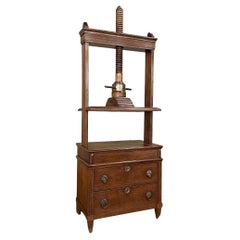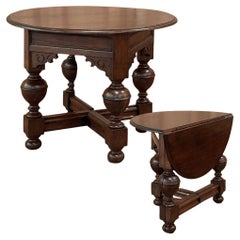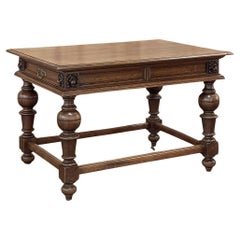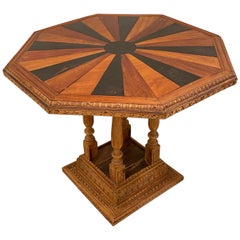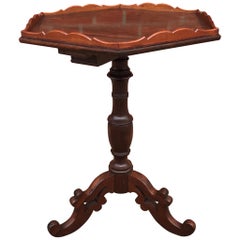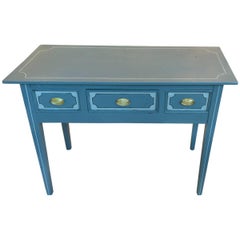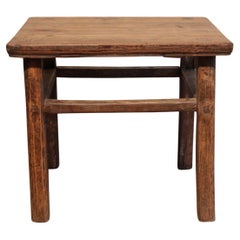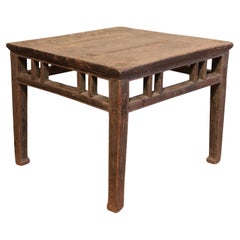Dutch Colonial End Tables
5
to
3
4
1
5
5
5
2,864
1,210
447
230
211
185
185
166
145
142
126
71
38
35
32
22
13
13
5
Height
to
Width
to
Depth
to
5
3
2
2
2
4
3
1
1
1
Style: Dutch Colonial
Early 19th Century Printer's Paper Press
Located in Dallas, TX
Early 19th century Printer's paper press is a superlative artifact from a bygone era, that will provide storage like a chest of drawers, an intriguing tabl...
Category
Early 19th Century Dutch Antique Dutch Colonial End Tables
Materials
Brass
19th Century Dutch Drop Leaf Table, Demilune Console
Located in Dallas, TX
19th Century Dutch drop leaf table ~ demilune console is one of the more unusual tables we've carried in the past three decades! Hand-crafted from solid planks and turned from solid ...
Category
Late 19th Century Dutch Antique Dutch Colonial End Tables
Materials
Oak
19th Century, Dutch Colonial End Table
Located in Dallas, TX
19th Century, Dutch colonial end table is the perfect choice for adding an Old World touch to any room! Use it in an entryway, library, bedroom, family room or anywhere a nicely size...
Category
1870s Dutch Antique Dutch Colonial End Tables
Materials
Brass
19th Century Dutch Ceylonese Specimen Table
Located in Southampton, NY
19th century Dutch Ceylonese specimen table, circa 1890. Handmade in the Dutch style with a Ceylonese twist on the base in Sri Lanka. Various woods include: Nadoun, satinwood, mahoga...
Category
Late 19th Century Sri Lankan Antique Dutch Colonial End Tables
Materials
Ebony, Mahogany, Satinwood
Amazing & Stylish Wine Table or End Table with Hexagonal Top on Tripod Base
Located in Lisse, NL
Fine quality, geometrical design, late 19th century table.
This beautiful quality hardwood table of colonial origin comes with a stunning grain in the solid wooden table top. This m...
Category
Late 19th Century European Antique Dutch Colonial End Tables
Materials
Hardwood
Related Items
19th Century English Regency Painted Serving Table
Located in Southampton, NY
19th century English Regency painted serving table.
Category
19th Century European Antique Dutch Colonial End Tables
Lovely Antique Sheraton Revival Hardwood Tripod Side End Lamp Wine Table
Located in GB
We are delighted to offer for sale this lovely late Victorian Sheraton Revival tripod table
A very good looking well made and decorative piece, it sits well in any setting and is...
Category
1880s English Antique Dutch Colonial End Tables
Materials
Hardwood
Vintage Hardwood with Brown Leather Top Gallery Rail Side End Lamp Wine Table
Located in GB
We are delighted to offer for sale this lovely Regency style mahogany side table with gallery rail and brown leather top
A good looking piece, the leather top has nicely aged, it...
Category
20th Century English Dutch Colonial End Tables
Materials
Hardwood
Early 19th Century Spanish Demilune Table
Located in Atlanta, GA
A very handsome early 19th century demilune table from Spain. Beautifully constructed with very Minimalist lines from walnut. Super patina.
Category
Early 19th Century Spanish Antique Dutch Colonial End Tables
Materials
Walnut
19th Century Pennsylvania Dutch Farmhouse Harvest Console Table
Located in Rio Vista, CA
Large and rustic 19th century Pennsylvania dutch farmhouse work table, harvest table, or console. The table features a two plank top measuring nearly 1...
Category
19th Century American Antique Dutch Colonial End Tables
Materials
Porcelain, Wood
19th C. French Charles X Restoration Period Sewing Stand Work Table
Located in Forney, TX
A scarce period Charles X (1818-1834) French Restoration mahogany travailleuse sewing (thread stand - side table - jewelry dressing table) with light, warm, beautifully aged patina.
Born in France in the early 19th century, almost certainly Parisian work, exquisitely hand-crafted, this exceptionally executed example features ornate gilt bronze ormolu mounts, escutcheons, and elaborate gilt metal trim. Having a highly figured light mahogany hinged lid top, lifting open to reveal a striking finished interior with divided compartments and original inset mirror plate. The conforming rectangular case fitted with a faux drawer front over a dovetailed drawer with sectioned interior. Elegantly rising on oval-shaped medial shelf stretcher-joined curvacious legs.
Dimensions (approx):
27" High, 20" Wide, 13.5" Deep
Stunning light almost blonde antique mahogany coloring and mellow warm tone, superb wood grain detail, and charming, beautifully aged patina over the whole. Great shape overall. Retaining original antique character marks, wear consistent with age and indicative of minimal use, nothing that detracts from the aesthetics or functionality, but only adds to the overall authenticity, refined elegant warmth, luxurious sophistication, and cozy unpretentious rustic elegance.
Delivered cleaned, hand waxed, polished French patina finish, ready for immediate use and generational enjoyment!
What is Charles X style:
The comte d’Artois – or Charles X - was the son of the dauphin Louis-Ferdinand de Franc and Marie-Josèphe de Saxe. He succeeded his two brothers Louis XVI and Louis XVIII and became the King of France in 1824. Thirty years after the French Revolution, he wanted to embody the return of monarchy and became the leader of the catholic party . As the previous kings, he was crowned in 1825 but he was soon overthrown by the revolution in July, 1830, called "Trois Glorieuses". He left then for England, Scotland, Prague and Istria where he died in 1836.
Charles X style lasted from 1818 to 1834 and happened during the Bourbon Restoration (French Restoration). This style did not replace totally the style of furniture from the French Empire but it was different from the formalism in the Napoleonic era, during which strictness and simplicity were inspired by Greco-Roman art. Indeed, artistic fields flourished. In terms of furniture, this renewal was suggested by the softening of shapes. Even though the simple aspect from the French Empire was still visible, shapes became curvier with volutes and arabesques. Another distinction is the loss of the massive aspect of furniture and the decrease of dimensions in order to decorate smaller appartments. Handling ability and comfort were key-words in the making of furniture. Apartments had essential elements such as chests of drawers, big rounded tables in the dining room, desks or secretaries, armoires and even dressing tables, comfortable fainting couches in the living room, small tables, pedestal tables, as well as gondola chairs. The wavy aspect of the latters certainly represent Charles X style the best.
One of the most emblematic features of this style is the use of bois clairs – light woods in warm blond tones - and indigenous woods that are varnished in order to highlight the grains. Bird's-eye maple, ash trees, plane trees, yew trees, beech trees, olive trees and cedar trees were most likely to be used. Indeed, at the beginning of the 19th century dark woods were hard to find. In 1806, the Napoleon’s Continental System was established in order to ruin the United Kingdom by preventing the country from any business with the rest of Europe. Therefore craftsmen had to find alternatives from mahogany which was the most commonly used material at this time. After 1815, the import of wood was even more difficult because of peace treaties and the European political situation, which contributed to the popularity of the bois clairs and indigenous woods. The furniture was often decorated with fine inlays made out of dark wood representing foliage, which contrasted with the veneer. Even though these patterns can look like bronze decorations from the Empire era, they were far more simple and did not represent any military or mythological attributes. On the tables, trays were sometimes made out of marble as in the French Empire, but it was often put aside and inlaid veneer, Verre Eglomisé – a type of glass with a mirror finish –, mirror or porcelain from Sèvres or Paris were more likely to be used.
Decorative elements from the Monarchy were highly appreciated again as they suggested luxury. Indeed, marquetry work was particularly fashionable - Boulle marquetry thrived around 1820 as the works of the Levasseur family can show. In the same way, draperies and trimmings referred to the monarchist splendour. Fabrics were often white – the traditional colour of the Bourbons – or light coloured as oppposed to the typical green from the Napoleonic era.
One of the most symbolic figures from this period of time might be Jean-Jacques Werner (1791-1849), a cabinetmaker who worked for prestigious clients such as the Duchesse de Berry who was Charles’s step-daughter. His works can be seen at the Musée des Arts Décoratifs and at the Grand Trianon in the Palace of Versailles. The duchess’s appartments situated at the pavillon de Marsan and at the Palais de Saint Cloud illustrate Charles X style the best with furniture made out of bois clairs and ornamented with dark wood patterns or fine gold decorations.
Chales X style allows a transition between the sobriety of the Empire style and the abundant aspect of Louis-Philippe style. The gothic style started at this time through the "style à la cathédrale", inspired by religious architecture, which thrived from 1827 to 1830. Indeed, at the beginning of the 19th century, Romanticism put the spotlight on the Middle Ages. Cabinetmakers were not inspired by the medieval furniture but rather by architectural elements of churches and cathedrals. For instance the backs of chairs were decorated with arches shaped like rib and serration. In the same way, before Charles X abdicated, pieces of furniture were made out of dark woods – such as mahogany, which was used again in France – and were inlaid with light wood. Romanticism also influenced the layout of furniture in appartments to suggest movement through a mix of various styles, various shapes and various sizes, as opposed to the static aspect of Neoclassicism. The start of industrialisation and mechanisation also influenced this style as early technical developments led to the production of pieces of furniture in series.
Credit:
Marc Maison
Bibliography:
FANIEL Stéphane (Dir.), Le Dix-neuvième Siècle Français, Collection Connaissance des Arts, 1957, Hachette
SASSONE, Adriana Boidi, Furniture from Rococo to Art Deco, 2000, Evergreen
--
Extremely versatile:
As warm and attractive as it is useful, this remarkable antique table having the ideal size and small proportions for a variety of different uses, including as a side table, accent or occasional table, tall sofa...
Category
Early 19th Century French Antique Dutch Colonial End Tables
Materials
Bronze, Ormolu
19th Century Console Table
Located in New York, NY
19th century Chinese console table. Three drawer thin console table elegant refined lines with ring pull handles. Detailed arch apron top of legs ta...
Category
1890s Chinese Antique Dutch Colonial End Tables
Materials
Elm
French Provincial Paint Decorated 2-Drawer Side Stands by White, 20th Century
Located in Big Flats, NY
A vintage pair of French Provincial style bombe end stands by White offer shaped top over double drawer case, raised on cabriole legs terminating in scroll form feet, paint decorated...
Category
20th Century American Dutch Colonial End Tables
Materials
Wood
H 25.5 in W 25 in D 17 in
Early 19th Century Regency Mahognay Three Tier Dumbwaiter
Located in Dublin 8, IE
Early 19th Century Regency mahogany three tier dumbwaiter with brass gallery top, brass upright all above carved pod with four outstretched legs with hidden casters.
Category
1810s Irish Antique Dutch Colonial End Tables
Materials
Brass
19th Century Colonial Bamboo Circular Tripod Table
Located in Petworth,West Sussex, GB
A large 19th century Victorian period Colonial bamboo circular occasional table. A circular dish top in hardwood with beautifully hand painted decorati...
Category
19th Century British Antique Dutch Colonial End Tables
Materials
Bamboo, Hardwood
19th Century Qing Dynasty Alter Console Table
Located in Pasadena, TX
19th century Qing Dynasty alter console table
Beautifully aged patina with 3 drawers and original brass pulls.
Cabinet is accented with scroll...
Category
Late 19th Century Asian Antique Dutch Colonial End Tables
Materials
Teak
19th Century French Empire Demilune Console Table
Located in Winter Park, FL
An early 19th century French Empire demilune console table with black marble top. Made of solid walnut with veneer of burled walnut. Turned columns with ebonized capitals. Good craft...
Category
Early 19th Century French Antique Dutch Colonial End Tables
Materials
Marble
Previously Available Items
19th Century Colonial Low Coffee Table in Hardwood
Located in Petworth,West Sussex, GB
A 19th century colonial low square side table or coffee table made from hardwood. Great patina.
The dimensions are:
Height: 50cm (19.7in)
Width:...
Category
19th Century Indonesian Antique Dutch Colonial End Tables
Materials
Hardwood
19th Century Colonial Low Coffee Table in Hardwood
Located in Petworth,West Sussex, GB
A 19th century colonial low square side table or coffee table made from hardwood. Great patina.
The dimensions are:
Height: 53cm (20.9in)
Width:...
Category
19th Century Indonesian Antique Dutch Colonial End Tables
Materials
Hardwood
Dutch Colonial Teak Side Table, Early 20th Century
Located in New York, NY
A small table from Indonesia, circa 1925. Hand-crafted in teak, distressed finish.
One drawer with metal pull, turned legs. High enough to serve as a small writing desk, as a conso...
Category
1920s Indonesian Vintage Dutch Colonial End Tables
Materials
Teak
Antique Folding Table, Dutch, Friesland, Oak, Ships, Tavern, Campaign circa 1880
Located in Hele, Devon, GB
This is an antique folding table, a Dutch piece from Friesland in the North West Region of the Netherlands. In oak, a ship's, tavern or campaign tab...
Category
19th Century Dutch Antique Dutch Colonial End Tables
Materials
Oak
Free Shipping
H 26.38 in W 29.53 in D 29.53 in
19th Century Friesland Painted End Table
Located in Dallas, TX
19th century Friesland painted end table hails from a region in what is now northern Netherlands, and displays obvious Germanic influence in the hand painted embellishment on top and...
Category
1880s Dutch Antique Dutch Colonial End Tables
Materials
Wood
Early 20th Century, Dutch Colonial Teak Side Table
Located in New York, NY
A vintage small teak side table from Indonesia, circa 1940. Dutch Colonial style. One-drawer, turned legs. Solid construction, aged patina confer...
Category
1940s Indonesian Vintage Dutch Colonial End Tables
19th Century Dutch Guiana Table in Mahogany with Turned Legs
Located in Miami, FL
From Dutch Guiana (present-day Suriname), a small handsome table in mahogany with scalloped apron and turned legs. Features pegged construction and a rich...
Category
Early 19th Century Surinamer Antique Dutch Colonial End Tables
Materials
Mahogany
Dutch Colonial end tables for sale on 1stDibs.
Find a broad range of unique Dutch Colonial end tables for sale on 1stDibs. Many of these items were first offered in the 19th Century, but contemporary artisans have continued to produce works inspired by this style. If you’re looking to add vintage end tables created in this style to your space, the works available on 1stDibs include tables, case pieces and storage cabinets and other home furnishings, frequently crafted with wood, oak and other materials. If you’re shopping for used Dutch Colonial end tables made in a specific country, there are Europe, Netherlands, and Asia pieces for sale on 1stDibs. It’s true that these talented designers have at times inspired knockoffs, but our experienced specialists have partnered with only top vetted sellers to offer authentic pieces that come with a buyer protection guarantee. Prices for end tables differ depending upon multiple factors, including designer, materials, construction methods, condition and provenance. On 1stDibs, the price for these items starts at $1,344 and tops out at $9,800 while the average work can sell for $1,984.
Recently Viewed
View AllMore Ways To Browse
Tessellated End Table
1958 End Tables
Brass Faux Bamboo End Table
Inlaid Marble End Table
Used Double Entry Doors
Whimsical Tables
Antique Brass Glass End Table
Mark David Table
Mccobb Brass Glass
Spiral End Table
Vintage Marble Top End Tables
White Lacquer Side Tables
Maison Bagues End Table
Round Mahogany Antique End Tables
Vintage Distressed End Table
2 Tier End Table Vintage
Entry Cupboard
Glass Top Rattan End Tables
